BMW 1 Series VS Nissan Leaf
BMW 1 Series
The BMW 1 Series stands out with its dynamic design that embodies both elegance and sportiness, making it an attractive choice for urban driving. Its interior offers a premium feel, combining quality materials with the latest in technological features to enhance comfort and connect drivers. Under the bonnet, a range of efficient engines ensures a responsive and enjoyable driving experience, balancing power with practicality.
more informationNissan Leaf
The Nissan Leaf stands out as a pioneering model in the realm of electric vehicles, known for its impressive blend of practicality and eco-friendliness. It offers a smooth and quiet driving experience, making it an ideal choice for city commuting and longer journeys alike. The interior design is both comfortable and intuitive, providing drivers with a sense of modernity and ease of use.
more information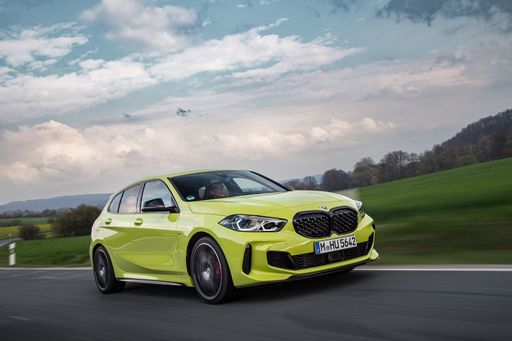 @ press.bmwgroup.com
@ press.bmwgroup.com
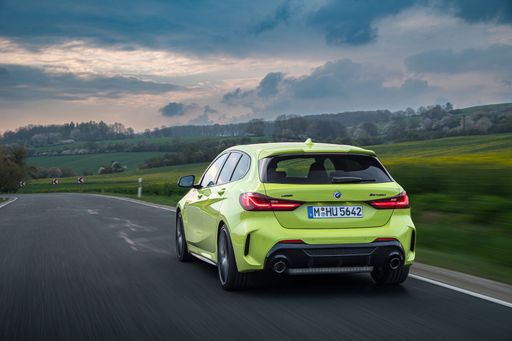 @ press.bmwgroup.com
@ press.bmwgroup.com
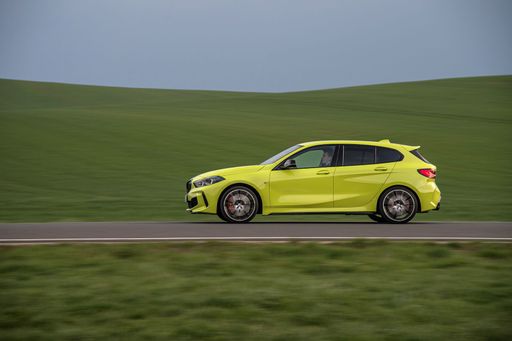 @ press.bmwgroup.com
@ press.bmwgroup.com
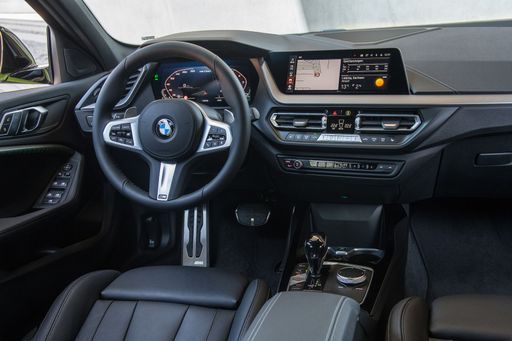 @ press.bmwgroup.com
@ press.bmwgroup.com
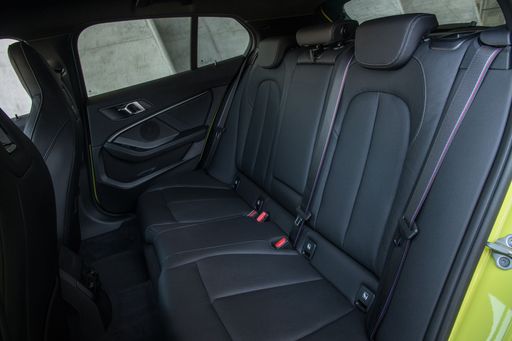 @ press.bmwgroup.com
@ press.bmwgroup.com
 @ germany.nissannews.com
@ germany.nissannews.com
 @ germany.nissannews.com
@ germany.nissannews.com
 @ germany.nissannews.com
@ germany.nissannews.com
 @ germany.nissannews.com
@ germany.nissannews.com
Costs and Consumption |
|
|---|---|
|
Price
about 30400 - 55000
$
|
Price
about 33200 - 40100
$
|
|
Consumption L/100km
4.3 - 7.6
L
|
Consumption L/100km
-
|
|
Consumption kWh/100km
-
|
Consumption kWh/100km
16.7 - 17.8
kWh
|
|
Electric Range
-
|
Electric Range
270 - 385
km
|
|
Battery Capacity
-
|
Battery Capacity
39 - 59
kWh
|
|
co2
112 - 173
g/km
|
co2
0
g/km
|
|
Fuel tank capacity
49
L
|
Fuel tank capacity
-
|
Dimensions and Body |
|
|
Body Type
Hatchback
|
Body Type
Hatchback
|
|
Seats
5
|
Seats
5
|
|
Doors
5
|
Doors
5
|
|
Curb weight
1465 - 1625
kg
|
Curb weight
1580 - 1756
kg
|
|
Trunk capacity
300 - 380
L
|
Trunk capacity
385 - 394
L
|
|
Length
4361
mm
|
Length
4490
mm
|
|
Width
1800
mm
|
Width
1788
mm
|
|
Height
1459
mm
|
Height
1540 - 1545
mm
|
|
Payload
475 - 510
kg
|
Payload
384 - 415
kg
|
Engine and Performance |
|
|
Engine Type
Diesel, Petrol MHEV, Diesel MHEV, Petrol
|
Engine Type
Electric
|
|
Transmission
Automatic
|
Transmission
Automatic
|
|
Transmission Detail
Automat. Schaltgetriebe (Doppelkupplung)
|
Transmission Detail
Reduction Gearbox
|
|
Drive Type
Front-Wheel Drive, All-Wheel Drive
|
Drive Type
Front-Wheel Drive
|
|
Power HP
122 - 300
HP
|
Power HP
150 - 217
HP
|
|
Acceleration 0-100km/h
4.9 - 9.8
s
|
Acceleration 0-100km/h
6.9 - 7.9
s
|
|
Max Speed
210 - 250
km/h
|
Max Speed
144 - 157
km/h
|
|
Torque
230 - 400
Nm
|
Torque
320 - 340
Nm
|
|
Number of Cylinders
3 - 4
|
Number of Cylinders
-
|
|
Power kW
90 - 221
kW
|
Power kW
110 - 160
kW
|
|
Engine capacity
1499 - 1998
cm3
|
Engine capacity
-
|
|
Top speed
210 - 250
km/h
|
Top speed
144 - 157
km/h
|
General |
|
|
Model Year
2024
|
Model Year
2019
|
|
CO2 Efficiency Class
D, C, F
|
CO2 Efficiency Class
A
|
|
Brand
BMW
|
Brand
Nissan
|
BMW 1 Series
Exploring the BMW 1 Series: A Compact Powerhouse
The latest iteration of the BMW 1 Series continues to set the benchmark for premium compact cars, blending cutting-edge technology and efficient performance. Known for its sporty design and responsive driving dynamics, the BMW 1 Series offers a range of options that cater to varied preferences and needs. Let’s delve into the technical details and innovations that make this vehicle a standout in its class.
Advanced Engine Variants and Performance
Under the hood, the BMW 1 Series offers a varied selection of powertrains, including diesel, petrol mild-hybrid, and pure petrol options. Power outputs range from 150 to an impressive 300 PS, allowing drivers to opt for either efficiency or sheer performance. The utilisation of mild-hybrid technology in some variants ensures a smooth and efficient drive, with increased torque available for dynamic acceleration.
All models come equipped with an Automatic Transmission, more specifically, a double-clutch gearbox for seamless gear transitions, offering a responsive drive whether you're navigating city streets or the open road. The top-of-the-line M135 variant boasts all-wheel drive capability, enhancing traction and control even further.
Efficient and Sustainable Driving
The BMW 1 Series is engineered for efficiency, achieving fuel consumption as low as 4.3 litres per 100 km in some diesel variants, while the petrol models also demonstrate competitive efficiency ratings. In terms of emissions, the range offers CO2 output figures between 112 to 173 g/km, garnering respectable CO2-efficiency ratings. Additionally, the mild-hybrid variants benefit from regenerative braking, which captures energy usually lost during braking and uses it to power the vehicle.
Innovative Technology and Comfort
Step inside the BMW 1 Series and you'll find a driver-focused cockpit outfitted with the latest in automotive technology. The infotainment system is hosted on a high-resolution display, providing easy access to navigation, entertainment, and vehicle settings. Key features like smartphone integration and voice control enhance the connectivity options available, creating a seamless link between driver and machine.
On the comfort front, the BMW 1 Series provides a refined interior experience, with high-quality materials and finishes. There's generous space for up to five passengers, alongside a versatile boot capacity that ranges from 300 to 380 litres, accommodating both daily errands and weekend getaways.
Design and Dimensions
The exterior design of the BMW 1 Series showcases its sporty lineage with a compact and agile silhouette. Measuring 4361 mm in length and 1800 mm in width, it maintains a confident road stance, while its height of 1459 mm contributes to a sleek, aerodynamic profile. Furthermore, the 1 Series is available in several stylistic options, providing aesthetics that can be customised to personal preference, including M Sport packages that introduce more aggressive styling cues.
Conclusion: A Harmony of Performance and Comfort
The BMW 1 Series deftly balances performance, efficiency, and comfort, making it a compelling choice for those in the market for a premium compact car. With its range of powerful engines, state-of-the-art technology, and stylish design, the BMW 1 Series remains a leader in its segment. Whether you prioritise sporty performance or efficient urban commuting, the 1 Series is equipped to deliver beyond expectations.
Nissan Leaf
Introduction to the Nissan Leaf: A Pioneer in Electric Mobility
The Nissan Leaf has established itself as a trailblazer in the realm of electric vehicles (EVs) since its launch. As we delve into its present-day iterations, the Leaf continues to soar in popularity due to remarkable advancements in technology and sustainability. Let's explore what makes the Nissan Leaf a standout in today's automotive market.
Power and Performance: Under the Hood of the Nissan Leaf
The Nissan Leaf boasts a power output ranging from 150 to 217 PS, depending on the battery option chosen. The vehicle's electric motor, a product of cutting-edge engineering, offers instant torque ranging from 320 to 340 Nm, resulting in impressive acceleration capabilities. The 0 to 100 km/h dash is achieved in as little as 6.9 seconds, showcasing its prowess in electric performance.
Battery Technology: Efficient Energy Management
When discussing the Nissan Leaf, battery technology is at the forefront. The available battery capacities range from 39 to 59 kWh, supporting an electric range between 270 to 385 km. This flexibility allows drivers to choose a model that best fits their driving habits, providing peace of mind for longer journeys without frequent recharging.
Sustainability: The Environmental Edge
One of the primary attractions of the Nissan Leaf is its commitment to sustainability. As an all-electric vehicle, it produces zero CO2 emissions, placing it in the top tier of the CO2-efficiency class with an 'A' rating. This clean energy approach contributes significantly to reducing environmental impact and supports Nissan's drive towards a greener future.
Design and Comfort: Aesthetic Appeal and Practicality
The Nissan Leaf is not just about efficiency; it's also designed for comfort and utility. With its sleek hatchback body and dimensions of 4490 mm in length, 1788 mm in width, and a height of up to 1545 mm, it offers ample interior space. The boot capacity ranges from 385 to 394 litres, providing sufficient storage for everyday needs. The model accommodates five passengers comfortably, ensuring a pleasant ride for everyone.
Innovations and Safety: Advanced Features for Peace of Mind
Nissan equips the Leaf with an array of intelligent features that enhance safety and convenience. The available equipment lines, including N-CONNECTA, Tekna, e+ N-CONNECTA, and e+ Tekna, offer varying levels of technology integration. ProPILOT Assist, e-Pedal, and a comprehensive suite of driver-assistance technology are just a few examples that highlight Nissan's commitment to innovation in the EV market.
Conclusion: The Nissan Leaf Continues to Lead
With prices ranging from €35,900 to €43,400, the Nissan Leaf remains an attractive choice for those looking to embrace electric mobility. It perfectly balances performance, design, and sustainability, making it a compelling choice in the competitive EV landscape. The Nissan Leaf not only represents the future of driving but also reinforces why it continues to be a leader in the electric vehicle community.
